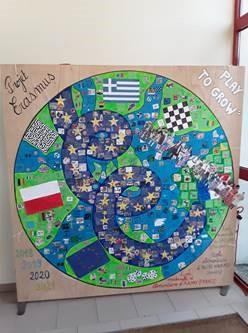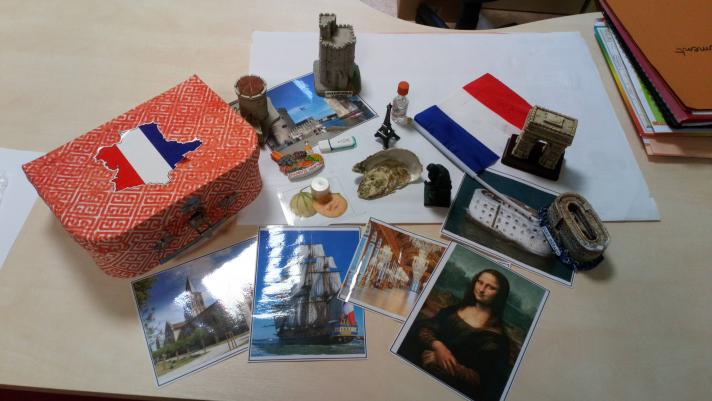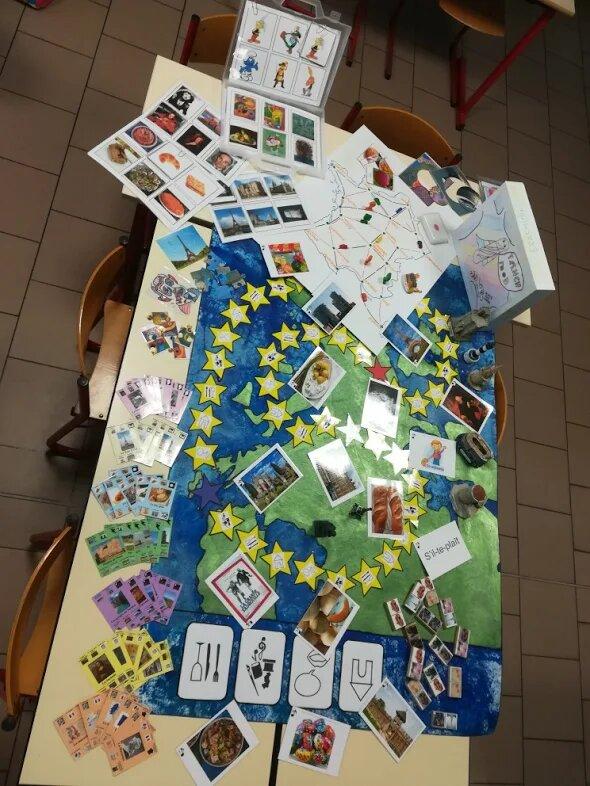Topic(s) addressed
Our Erasmus project “Play to Grow” utilised an innovative gaming approach in its implementation, given that playing is itself an action that allows children to progress regardless of their age or school experience; furthermore, each student was fully involved in a project that allowed them to easily acquire disciplinary or cross-disciplinary skills. This project, due to its inclusivity, also made it possible for students to build positive relationships with the school, while facilitating intergenerational and intercultural work. Given the universal ‘language’ of gaming, exchanges between students were made possible across all settings, which enabled them to forge a European culture through the peer-exchange process. The nature of the game, which allowed students to ‘get out’ of the traditional classroom setting, made it possible for them to renew and strengthen a number of pedagogical practices – leading to increased global considerations of the pupil’s career. Moreover, playtime not only facilitated student wellbeing, it also helped in the fight against school dropout rates, and increased their openness to other students.
Target groups
The target group was made up of students and adults from France, Greece, and Poland. The French group consisted of 60 pre-elementary students between the ages of 2-5, 110 pre-elementary students between the ages of 6-11, 2 headteachers, 3 assistants, and 2 foreign-language teaching advisors. Many of the French students came from socially disadvantaged backgrounds and studied at schools located within the rural revitalisation zone (ZRR) – 25 kilometres from the closest cultural centre. The Greek contingent comprised of approximately 120 students, 1 headteacher, and 6 teachers from the island of Crete, which is dependent on tourism and suffers from a high unemployment rate. Lastly, the Polish group consisted of approximately 250 students between the ages of 3-6, 1 headteacher, 1 adviser, 15 teachers, and 8 assistants from a city school. Given that schooling is not compulsory in Poland for this age group, it could be assumed that Polish students came from relatively wealthy backgrounds.
Methodologies
The project’s goal was to use ‘play’ to work on all disciplinary and transversal skills, with the former having consisted of the application of strategic work in class on a number of specific areas such as vision in space, lexicon, calculation, and the construction of sentences, while the latter comprised activities on empathy, concentration, respect for rules, cooperation/competition, listening, attention, and acceptance of others. Trade games were carried out in different languages so as to address different work areas, with game creation facilitating cultural reflection (ours, those of others), and ways in which it may be incorporated into play (projection and the development of transversal reflection). Construction allowed for students to concretely apply math, science, and languages towards communication efforts, thus teaching them ways to easily communicate with other who may not share similar language codes or languages. The concept of ‘play’ also enabled students (both ‘good’ and those with learning difficulties) to participate and contribute using their ideas, with close cooperation facilitated among all participants due to the activity’s level playing field. Overall, participants’ discovery of the ‘world of games ‘ through a designated meeting with game and growth specialists/professionals allowed for parents to appreciate the need for play – for both children, as well as adults.
Environments
Transversal work was implemented across school subjects, as well as with a number of actors. This included the kindergarten, which shares the same building as the elementary school, and with which a number of projects had been integrated – including the Erasmus project. While both are administratively separate, the project was carried out in conjunction with the kindergarten based on students’ interests and the school’s overall profile. Additionally, transversal work was implemented between schools (schools within the sector often have projects in common so as to create a more dynamic environment for students), and the township (college, EHPAD, the elderly, ITEP, local associations, and USEP-school sports associations). Modification/reflection was encouraged among students through play and games, which increased their autonomy, and facilitated their organisational capacity and ability to create links within the learning environment.
Teachers
The robust pre-existing partnership between kindergarten and elementary school teachers were further strengthened; larger scale intervention in language training was made possible; a strong partnership was developed with the college through the project’s creation of a game club (which facilitated pedagogical exchange); the introduction of a project manager facilitated linkages between different schools (coupled with the use of games as a different approach to working); and, exchanges were facilitated with the Therapeutic, Educational and Pedagogical Institute (ITEP), which enabled students to confront their difficulties, facilitated game creation and exchange, and allowed for exchanges among professionals on the benefits of games and play in education.
Impact
The project produced a number of impacts, including a sense of awareness among students of belonging to Europe, and the understanding that cultural differences may be appreciated without a sense of judgement. A more peaceable relationship was observed among students who helped one another, with less tension and competitiveness (as well as increased confidence) noted among teachers; moreover, students showed enthusiasm for the project when discussing it with new students. Partnership with Un jeu dans ma classe (https://unjeudansmaclasse.com/) resulted in students who were placed in the role of testers within an actual game culture producing highly constructive critiques while experimenting with game variations, with confidence and willpower displayed throughout the experience. Lastly, exchanges took place among the project’s student participants, and, on their return to the Strasbourg parliament, ambassadors were sent to colleges to present games to supervisors, teachers, and management staff.
- Reference
- 2018-1-FR01-KA229-047694
- Project locations
- France
- Project category
- Primary education
- Project year
- 2021
Stakeholders
Participants
5th Primary School of Aghios Nikolaos
- Address
- Greece
Przedszkole nr 12 Plastusiowo w Gnieźnie
- Address
- Poland



